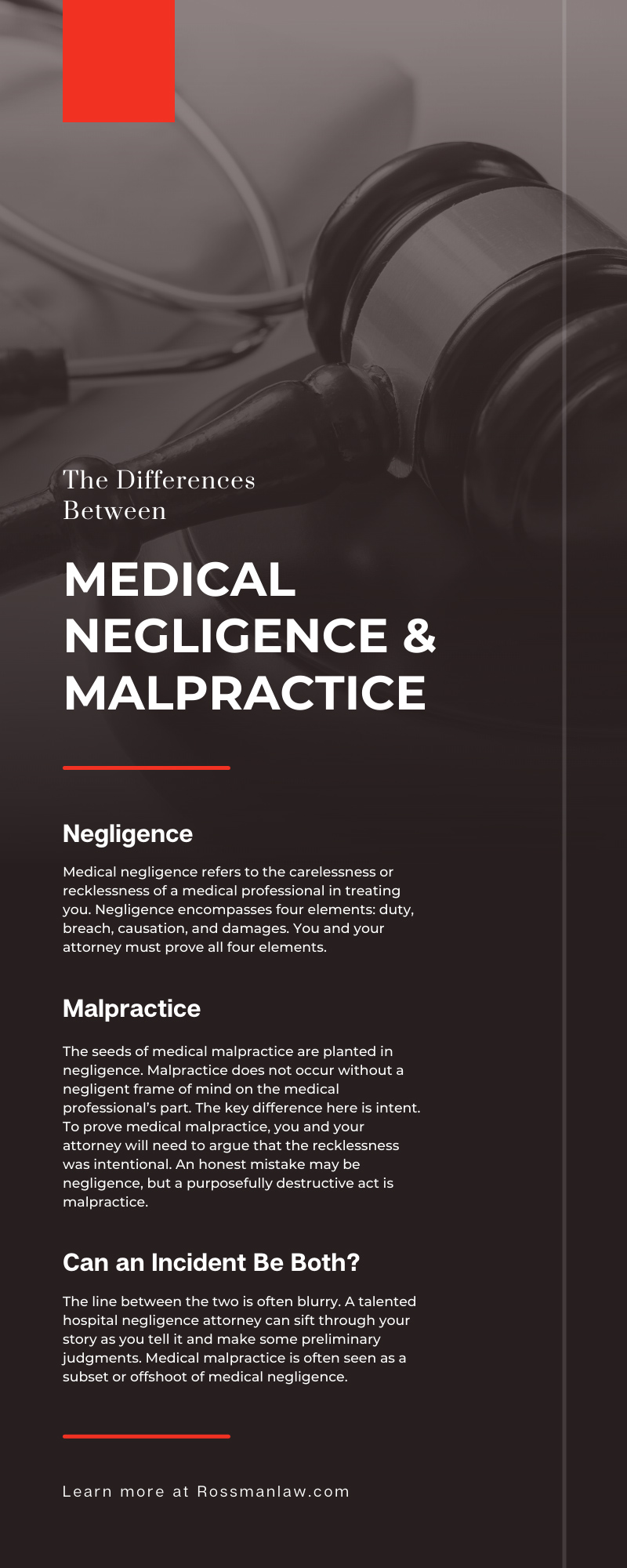
How To Sue a Doctor or Hospital in Boise, Idaho
September 7, 2022
Semi-Truck Accident Statistics Everyone Should Know
September 14, 2022What are the differences between medical negligence and malpractice? Have you experienced one, both, or neither?
The answer to that question depends on your particular circumstances, and an attorney at Rossman Law Group can give you more specific advice when you call for your free consultation. However, there are definite differences between malpractice and negligence.
Learn more about the two legal terms so you can make an informed decision about potentially filing a lawsuit. This guide will break down the legalese into more understandable terms. When you know the type of suit you’re filing and which claims you’re making, you can be a more active part of the legal process.
Negligence and Malpractice Defined
Let’s look at the definitions of these two words separately and in simple terms.
Negligence
Medical negligence refers to the carelessness or recklessness of a medical professional in treating you. Negligence encompasses four elements: duty, breach, causation, and damages. You and your attorney must prove all four elements, outlined below.
- First, a doctor or hospital must have an established duty of care to you. In medicine, it’s often called a standard of care. You will need to prove that the defendant had a legal (and ethical) duty to provide you with the best care possible.
- Next, you will have to prove that they breached that duty by being careless or reckless in some way.
- In order to win a negligence case, you and your attorney will then need to show the court that the breach was the cause of your injury.
- Finally, you’ll need to prove to the court that you were injured, or damaged, as a direct result of that breach.
When dealing with medical negligence, you and your lawyer will need to argue that this negligence breached an accepted medical standard of care. In other words, would another medical professional have made the same mistake?
Malpractice
The seeds of medical malpractice are planted in negligence. Malpractice does not occur without a negligent frame of mind on the medical professional’s part. The key difference here is intent.
To prove medical malpractice, you and your attorney will need to argue that the recklessness was intentional. An honest mistake may be negligence, but a purposefully destructive act is malpractice. If a healthcare professional is aware of the harm their treatment may cause and moves forward with it anyway without warning you, that act could constitute malpractice.
Examples of Negligence vs. Malpractice
Let’s say you recently had major surgery. In the operating room, the surgeon accidentally cut a blood vessel or a piece of muscle. Perhaps that injury goes on to cause further complications. While it may be negligent on their part, it likely doesn’t constitute malpractice.
But what if you didn’t need to be in surgery in the first place? What if your doctor failed to try non-invasive treatment options first, insisting that a surgical procedure was the only way to help? If you find yourself the victim of a totally unnecessary surgery, call an attorney—that doctor’s actions may count as medical malpractice.
Another common example of medical negligence is the mismanagement of prescriptions. Say, for example, that your doctor diagnosed you with type 2 diabetes. They write out a prescription for a medication that could help you, but instead of writing “metformin,” they jot down “metronidazole.” The former is a helpful medication for those with diabetes, but the latter is an antibiotic for skin infections. Getting the wrong medication can seriously hamper your treatment. While the doctor in this case may have behaved negligently, it was likely an honest mistake.
On the other hand, if your doctor prescribes metformin without consulting your medical history and running the appropriate tests, there may be something deeper at play. Prescription meds should not be treated like over-the-counter solutions. Some folks end up with medications prescribed for conditions they don’t even have—depending on the outcome, that could constitute malpractice. The doctor knew they should have run tests first, but went directly to their prescription pad anyway.
Can an Incident Be Both?
Are you wondering if the ordeal you experienced counts as both negligence and malpractice? The line between the two is often blurry. A talented hospital negligence attorney can sift through your story as you tell it and make some preliminary judgments. Medical malpractice is often seen as a subset or offshoot of medical negligence.
When you meet with your attorney, they will likely ask you a few questions to get the clearest picture possible. The list of questions may include the following:
- What occurred in the days, hours, and minutes leading up to the error in question?
- Was your doctor or other medical professional aware of the potential consequences of their actions (or lack thereof) before performing them?
- Was the medical professional in question acting in good faith, or actively trying to provide the best possible care?
- Were there any protocols in place to prevent this sort of error from happening? If so, what happened to those protocols? Were they ignored?
- Ultimately, could the error be construed as an honest mistake? Would another reasonable medical professional have made the same mistake in those circumstances?
At the end of the day, your attorney is looking for intent—that’s the point where negligence can cross over into malpractice. While all acts of medical malpractice are inherently negligent, not all acts of medical negligence constitute malpractice.
If your unfortunate ordeal in the hospital does constitute malpractice, the incident can encompass both negligence and malpractice. However, if it was an honest error, it would not encompass both.
Whether you’re dealing with a negligence or malpractice case, you will need to work closely with your attorney to build your case. Hang on to every medical bill that comes your way, and write out a detailed account of your time in the hospital. Rossman Law Group works hard to fight for fair settlements for injured parties.
Even if you are experiencing the negative after-effects of a doctor’s honest mistake, you still deserve compensation for medical and emotional damages. Keep the differences between medical negligence and malpractice in mind as you meet with your attorney. Be honest through every step of the process, and rest assured you’re in good hands with Rossman Law Group.






